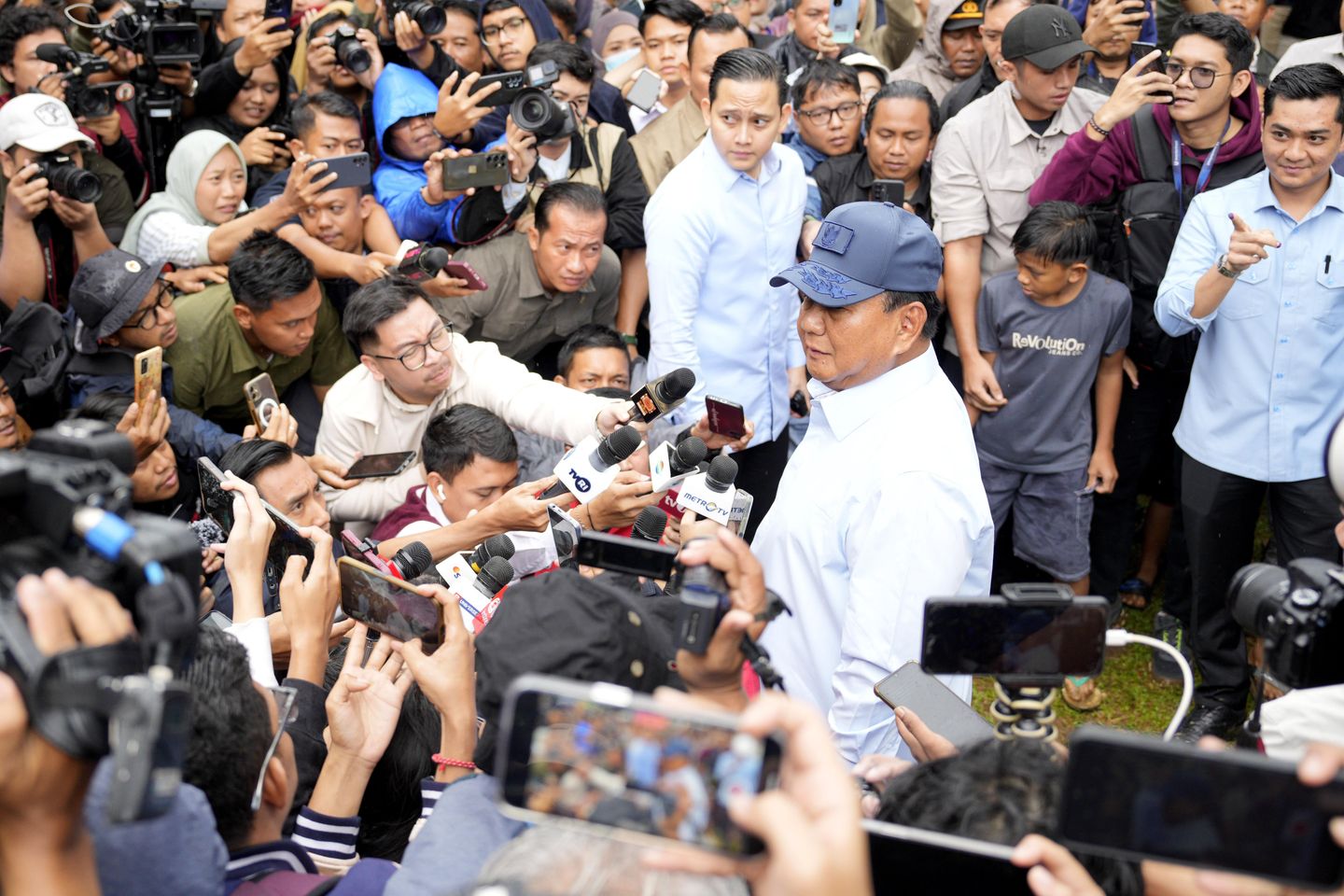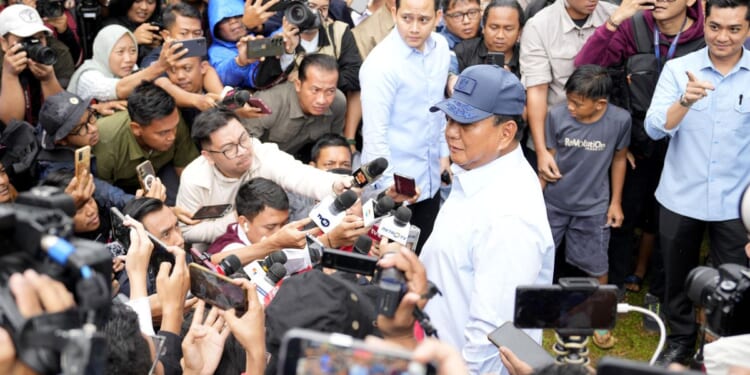
SEOUL, South Korea — Defense Minister and former commando Prabowo Subianto has claimed victory in Indonesia’s presidential election after opening a big lead in preliminary results late Wednesday.
Although electoral officials had not confirmed a win for the conservative candidate, he told cheering supporters in Jakarta that the race was over.
The 72-year-old American-educated and -trained defense chief will succeed popular President Joko “Jokowi” Widodo.
The transition may prove bumpy for the Biden administration.
Allegations of human rights abuses have dogged Mr. Subianto’s military career, and he was formally banned from visiting the U.S. for nearly two decades.
“This victory must be a victory for all Indonesian people,” he declared in his televised remarks. “I will lead … all the people of Indonesia, regardless of tribe, ethnic group, race and religion, and social background. The people of Indonesia are our responsibility to protect.”
Beijing and Washington were keenly watching the election, a massive logistical undertaking. Indonesians across the vast archipelago, covering three time zones, also voted for thousands of parliamentary representatives and local officials.
With a population of almost 274 million, Indonesia is the world’s third-largest democracy behind India and the U.S. Its population is a multiethnic patchwork worshipping religions including Animism, Buddhism and Christianity, but its dominant Muslim population of more than 241 million makes Indonesia the world’s most populous Islamic nation.
Running against two provincial governors, Mr. Subianto captured nearly 60% of the early returns — enough to avoid a runoff election and take office outright.
His campaign was fortified by his vice presidential running mate, Gibran Rakabuming Raka, the eldest son of Mr. Widodo. In a twist, the two are running for Mr. Subianto’s conservative opposition party, Gerindra, but their joint ticket is widely considered a vote to continue the president’s rule.
Mr. Widodo has overseen impressive economic growth during his decade in power, but he is constitutionally barred from seeking a third term.
Mr. Subianto was well ahead of his rivals, Anies Baswedan and Ganjar Pranowo, in polls leading up the vote.
No bloodshed was reported in the elections in a land torn by violent political, ethnic and religious strife in the late 1960s and late 1990s. Some 200,000 security personnel were reportedly deployed to keep the peace.
In Washington, the State Department congratulated Indonesian election officials on the apparent smoothness of the vote but was waiting for an official tally before commenting on the result.
A candidate needs more than 50% of votes counted and a minimum of 20% of the ballot in half the country’s far-flung provinces to avoid a runoff with the second-place finisher. Mr. Subianto was closing in on the threshold for outright victory, press accounts said.
Lingering questions
Though a Subianto win would be seen as a vote for stability and economic growth, questions loom about the road ahead, including the role of the youthful running mate and controversies stemming from the defense minister’s long military career.
Mr. Subianto lost the presidential races to Mr. Widodo in 2014 and 2019. Deadly riots erupted in Jakarta after he refused to accept the result, but Mr. Subianto subsequently joined Mr. Widodo’s Cabinet and the U.S. dropped its travel ban.
Mr. Widodo appeared beside Mr. Subianto during the campaign, but his son’s move to join the candidate has generated controversy.
Mr. Raka, 36, is governor of Solo, his father’s hometown. The vice president must be at least 40 under the Indonesian Constitution, but the Constitutional Court, led by Mr. Raka’s uncle, exempted him because of his experience as mayor.
More serious controversies swirl over Mr. Subianto’s past.
His wealthy, well-connected family went into exile under President Sukarno, the father of independence from the Netherlands and ruler from 1949 to 1967. Mr. Subianto went abroad and graduated from the American School in London.
When Gen. Suharto took power in 1968, Mr. Subianto returned home. He entered the Indonesian Military Academy and subsequently married Suharto’s daughter. He served in and later commanded the Kopassus, a special forces unit widely censured for violence against anti-government forces in East Timor. Timor won its independence in 1999.
Mr. Subianto has staunchly denied participating in any abuses.
In a highly decorated career, Mr. Subianto fought in Timor, received U.S. Special Forces training at Fort Bragg, doubled the Kopassus’ size and commanded Jakarta’s strategic reserve.
In 1998, the year Suharto stepped down amid the Asian financial crisis, Mr. Subianto was allegedly involved in kidnapping and torturing pro-democracy activists after deploying Kopassus-trained troops to Jakarta to restore order.
Dishonorably discharged, he went into business with his wealthy brother before founding the nationalist Gerindra Party in 2008. His first unsuccessful political foray, for the vice presidency in 1999, was followed by two failed runs for the presidency in 2009 and 2014.
Some fear the presumed president-elect may allow his vice president to create a Widodo political dynasty or that he will pack his government with military cronies and restore Suharto-style authoritarianism.
Mr. Subianto, however, has sought to project a softer, avuncular image. Social media videos show the former commando dancing, cuddling his cat and forming the “heart” gesture with his hands.
Strategic impact
Indonesia’s 17,000 islands are rich in natural resources, including gas, gold, oil and nickel. They command strategic regional channels and link the Pacific with the Indian Ocean via the Malacca Strait. Mr. Widodo’s economic agenda, dubbed “Golden Indonesia 2045,” aims to make the country one of the world’s top five economies with a gross domestic product of up to $9 trillion over the next two decades.
Jakarta maintains good relations with Washington, and their militaries have cooperated in joint Garuda Shield drills. Still, the Widodo government has kept lines open to China. In October, Indonesia opened its first bullet-train rail line, financed by Chinese investment.
At the White House in November, Mr. Widodo and President Biden announced a “comprehensive strategic partnership,” but Jakarta has tried to straddle a middle line diplomatically between China and the U.S. in the superpower competition for influence and allies in the region.
“Indonesian foreign policy is rooted in nonalignment,” Brian Harding of the U.S. Institute for Peace said after the November summit. “There is diversity within the Indonesian system, where concerns over China’s increasingly aggressive military posture are widespread, particularly in … the southern reaches of the South China Sea. … However, there is widespread agreement that China is an important economic partner and that Jakarta must deftly navigate U.S.-China rivalry.”
Israel’s war against Hamas in the Gaza Strip is another sticking point for a country with such a large Muslim population.
“The Israeli-Palestinian problem remains one of the stumbling blocks of really warm relations between Jakarta and Washington,” Dewi Fortuna Anwar, chair of the think tank the Habibie Center, told the Carnegie Endowment last year.












